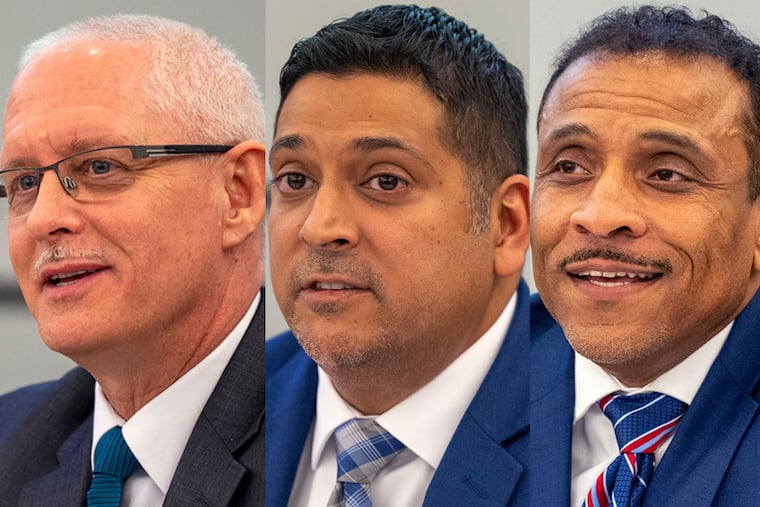Philadelphia celebrates Women’s History Month with a lineup of all-male candidates for our next superintendent | Helen Ubiñas
It's absurd that no women — in a profession full of women — made the cut. That the finalists were unveiled during a month meant to honor women’s achievements made the disparity even more pronounced.

Gosh — if only there were enough women in education, and if they, you know, showed any real interest, then maybe at least one would have made the cut of finalists to be Philadelphia’s next superintendent of schools.
Yeah, I know — this sounds ridiculous. As ridiculous as someone with a straight face deciding that in 2022 it would be acceptable to insist that no women educators, in a profession full of women, were qualified for the top position.
You don’t need to have tested well on your SATs to know that women make up an overwhelming number of K-12 educators. But the numbers prove it: Women account for 76% of public school teachers, according to the U.S. Department of Education. In public schools nationally, women make up 54.2% of principals, according to government data. Not only that, but the majority of principals and assistant principals in Philadelphia are … wait for it …women.
But when it comes to becoming a school superintendent, only about 27% of women land the job nationally, according to federal data and a survey conducted by the American Association of School Administrators. And Philadelphia is doing nothing to change that. That the finalists were unveiled during a month meant to honor women’s accomplishments only made the disparity more pronounced.
You’d think that someone — a well-paid communications firm involved in the process, perhaps? — would have picked up on the optics here.
Happy Women’s History Month!
Since the three finalists — all men, none from Philadelphia — were announced, there have been an array of explanations and theories offered for the Testosterone Trio.
From the start, the pool of 400 candidates was overwhelmingly (more than 70%) male. And the field stayed that way as the members of the search committee narrowed their choices, moving some to wonder if the lack of women spoke more to the lack of appeal of the job. Maybe — considering how women have disproportionately been affected during COVID-19. But I don’t buy it.
More officially, those involved in the process cited competition as another reason, as Philadelphia was in the running with other districts vying for new superintendents.
Despite the backlash, Leticia Egea-Hinton, the vice president of the school board who is leading the process, made no apologies for the all-male finalists when we briefly spoke.
“Deciding up front that the best candidate had to fit any particular identity would have been short-sighted,” she said — ignoring the fact that no one has seriously suggested that the superintendent must be a woman, only that women should be fairly represented in the search.
It’s not as if qualified women aren’t out there. “There are leaders who are here who can do the work,” said Robin Cooper, president of the union that represents school principals in Philadelphia. “We’re not saying get incompetent women. We’re not saying get women with no credentials. We’re saying there are women — and other Philadelphians — that are here that have those qualifications, and they were overlooked.”
The lack of women finalists even surprised some involved in the process.
“I was shocked, given today’s world and where we are,” said the Rev. Mark Tyler, a senior pastor at Mother Bethel A.M.E. Church, who was part of an advisory group to help search for the next superintendent. A pool of six candidates interviewed by the advisory group included women, he said. Though, he added, the three finalists do represent a diverse group in terms of racial and ethnic backgrounds and experience. (The finalists are John Davis, the chief of schools in Baltimore who has also worked in Washington, D.C.; Krish Mohip, the deputy education officer for the Illinois state Board of Education, who has also served as head of Youngstown, Ohio’s school system; and Tony Watlington, the superintendent of Rowan-Salisbury Schools in North Carolina.)
The problem, Egea-Hinton said, isn’t the strong candidates she’s standing by, but a broken talent pipeline.
”There needs to be work in creating a pipeline for more diverse leaders from teacher to superintendent no matter the gender,” Egea-Hinton said. “We’re not just looking at women, just women, we’re looking at Black and brown candidates as well.”
Ah, yes: the ol’ pipeline defense. Egea-Hinton wasn’t wrong when she pointed out that it’s an ongoing issue in school systems across the country. But it’s also quickly become the evergreen excuse for the lack of diversity and inclusion in all kinds of fields, from boardrooms to newsrooms to classrooms.
“To say we couldn’t find one qualified woman, anywhere in the country, or even in Philadelphia that we will consider as a finalist for this position, if I were a current district employee and I were a woman I would feel slighted,” said Lisa Haver, a retired teacher and cofounder and coordinator of the Alliance for Philadelphia Public Schools, an organization made up mostly of retired district educators formed to fight against school privatization. The group — citing the absence of finalists who were women or Philadelphians — held a rally outside district offices Thursday afternoon to call on the board to continue the search.
Egea-Hinton said that’s not going to happen. “We’re not starting over, let me be clear about that,” she said. “That would mean waiting until 2024 to begin a superintendent search, and our children can’t wait.”
I don’t know about that. Philadelphia’s children have waited for years for safe drinking water in their schools, for air-conditioning, and — in far too many instances — for a quality education.
What’s a little more time to wait to ensure that the person charged with making decisions on their behalf truly reflects and represents them?